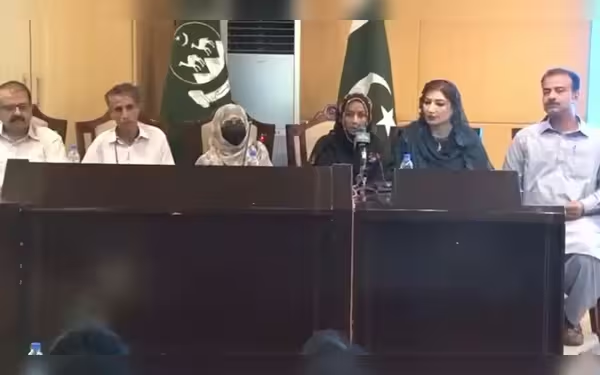Saturday, November 16, 2024 07:40 PM
Adeela Baloch Thanks Balochistan Government for Rescue from Terrorists
- Adeela Baloch expresses gratitude to Balochistan government.
- Reveals coercive circumstances behind women's involvement in extremism.
- Calls for stronger support systems to prevent radicalization.
 Image Credits: radio.gov.pk
Image Credits: radio.gov.pkAdeela Baloch thanks Balochistan government for her rescue, highlighting women's coercive circumstances in extremism.
In a shocking turn of events, Adeela Baloch, a woman who was apprehended in Turbat, has expressed her gratitude towards the Balochistan government for rescuing her from the clutches of terrorist groups. This incident sheds light on the complex issues surrounding extremism in the region, particularly concerning the role of women in such activities.
Adeela, who was identified as a suicide bomber, has made a significant statement that challenges common perceptions. She emphasized that Baloch women do not engage in suicide attacks out of their own volition. Instead, she highlighted the coercive circumstances that often lead individuals into such dire situations. This revelation is crucial as it opens up a dialogue about the underlying factors that drive people, especially women, into the arms of extremist groups.
The Balochistan government’s intervention in this case has sparked discussions about the need for more robust measures to protect vulnerable individuals from being exploited by terrorist organizations. It raises important questions about the support systems available for those who may be at risk of radicalization. Adeela’s experience serves as a reminder that many individuals caught in the web of terrorism are not willing participants but rather victims of circumstance.
As the situation unfolds, it is essential for society to understand the broader implications of such incidents. The narrative surrounding women in extremism is often oversimplified, leading to stigmatization and misunderstanding. By acknowledging the complexities involved, we can foster a more informed and compassionate approach to addressing the challenges posed by terrorism.
Adeela Baloch’s story is not just about one woman’s escape from a life of violence; it is a call to action for communities and governments alike. It urges us to look beyond the surface and recognize the multifaceted nature of extremism. Only through understanding and addressing the root causes can we hope to prevent future tragedies and support those who are caught in the crossfire of such conflicts.













